The Rediff Special/Swaran Singh
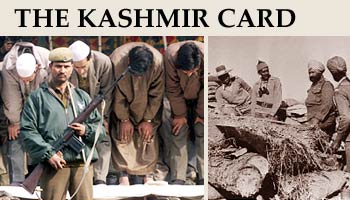

The continued violence in the Kashmir valley --- and its final outcome in Kashmir becoming a nuclear flashpoint --- is perhaps the most decisive legacy of the 1962 India-China border conflict.
The Kashmir quagmire could never have obtained the eminence that it has today had there been no India-China war in 1962, or had things not changed the way they did following the short-lived Sino-Indian bonhomie of the mid-1950s.
Though it is difficult to blame any one side or personality yet, if one were to pick and chose one decisive event in Kashmir's recent history, then the origins of most of the sub-strands of the Kashmir imbroglio today can be linked to various events in the run-up to the India-China border conflict.
By extension of the same logic, therefore, the answer to the Kashmir problem perhaps lies in undoing those negative trends and influences that contributed to Kashmir becoming such a complicated and threatening nuclear flashpoint.
Pakistan started its innings with the distinction of being part of anti-China military alliances like South East Asian Treaty Organisation (SEATO) and Central Treaty Organisation (CENTO). Besides its unison with India in denouncing China's military invasion of Tibet during early 1950s, till as late as October 23, 1959, President Ayub Khan had publicly been threatening China with "dire consequences" for its military incursions into Hunza and adjoining territories.
Indeed, on September 10, 1959, during his stopover at New Delhi's Palam airport (flying from West to East Pakistan), Ayub Khan had formally proposed a joint defence of the subcontinent, implying India-Pakistan defence co-operation against the Chinese. All this threatened Beijing a great deal, and was to play a vital role in its South Asia policy as also its policy on Kashmir, which defines the core of South Asian security and peace.
This was also the time when the initial symptoms of the Sino-Soviet split and the sinews of Indo-Soviet defence co-operation had begun to surface, thereby making Beijing all the more paranoid about these two giants (India and Russia) coming together in the Pamirs and manipulating China's soft underbelly in Tibet and Xinjiang.
This was one factor that was responsible for Beijing's wooing of Pakistan after their first contact during the Bandung Afro-Asian Conference of April 1954, but especially after the exchange of visits by their premiers in 1957.
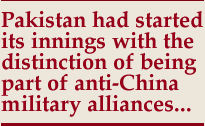 This indulgence by China was aimed simply at (a) ensuring security of their problematic regions bordering Kashmir by befriending neighbouring Muslim countries and (b) using Pakistan as its bulwark to tie down India in South Asia, thereby warding off any future threats to Tibet's peace and security.
This indulgence by China was aimed simply at (a) ensuring security of their problematic regions bordering Kashmir by befriending neighbouring Muslim countries and (b) using Pakistan as its bulwark to tie down India in South Asia, thereby warding off any future threats to Tibet's peace and security.
China had also tried to befriend India to resolve its fear psychosis on Tibet, but once these equations reached their nadir following the Dalai Lama's asylum in India, the derailment of India-China ties perfectly coincided with the opening of China's negotiations with Pakistan to settle its border with Pakistan-occupied Kashmir.
China's military attack in Ladakh in October 1962 heralded its future role in Kashmir.
And finally, the Anglo-American interest in Kashmir --- that has antecedents far older than the recent initiatives on the Kashmir problem --- had also contributed to China's suspicions about India playing a frontline role in the West's containment policy.
India itself contributed to such fears by unilaterally laying claims to Kashmir's northern and western borders based on the Johnson Line, the northernmost of all the three boundary lines marked by the British government in defining Kashmir's borders with Xinjiang.
Had India either consulted the Chinese on this subject or even followed the only official proposal that the British had made to China in 1899, proposing a line that ran through the Mustagh-Karakoram-Laktsang Line and including the Lingzhithang plains but not including northeastern Aksai Chin, things might have been different. This would have meant leaving the Karakoram highway (which became a bone of contention) far north of these borders.
This made Beijing denounce India's claims in Kashmir as an extension of the imperial policies of the British, and this was to colour their vision on India-Pakistan claims on Kashmir. In practice, this made China (a) fortify its heavy defences in territories bordering Kashmir, (b) settle Xinjiang's borders with Kashmir even at the cost of making concessions that the weak Manchus had refused to make to the mighty British, (c) physically take control of about 20 per cent of Kashmir province that was seen as its bargaining chip for settling the India-China boundary, (d) emerge as the largest and most reliable weapons supplier to Pakistani military regimes, and (e) launch an anti-India joint front with Pakistan and raise an anti-India campaign on Kashmir throughout 1960s.
China's indulgence and negotiations on border settlement with Pakistan-occupied Kashmir was to greatly bolster Pakistan's claim on Kashmir. With an agreement-in-principle announced during December 1962, and the formal agreement signed in Beijing on March 2, 1963, these two years were to lay the very foundations of Beijing's "special relationship" with Islamabad which had its most decisive impact of China putting its weight behind Pakistan's claim on Kashmir.
Apart from the moral support and military supplies during the 1960s and 1970s, this was to later flourish into a unique example of one state propping up another nuclear-weapon state. Even the United States in 1945 had refused to share the nuclear bomb with the British, though British scientists had participated in the Manhattan project for developing nuclear devices on an urgent basis.
The pertinent question is whether China saw its national interests promoted by backing Pakistan's claims on Kashmir and in arming Pakistan with nuclear technologies to realise its dream. On this experts on both sides remain equally inconclusive.
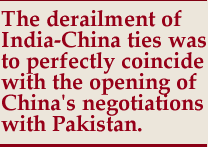 Going by China's actual behaviour until recent years, however, it was perhaps continued instability in Kashmir that was seen as the best option for ensuring the security of China's Tibet and Xinjiang.
Going by China's actual behaviour until recent years, however, it was perhaps continued instability in Kashmir that was seen as the best option for ensuring the security of China's Tibet and Xinjiang.
Assuming the contrary, that China was really interested in resolving Kashmir, 1962 was clearly India's weakest moment in its post-Independence history. Moreover, this was also the only time when Pakistan could have achieved a most favourable solution on Kashmir.
Indeed, during the India-China war of 1962, there were voices, loud and clear, in Pakistan urging President Ayub Khan to use this occasion to settle Kashmir once and for all. The Anglo-American establishments had fully understood this situation and their officials had been working in tandem to hammer out a solution to this intractable problem apparently in favour of the incorrigible military regime of Pakistan.
The excuse for asking India to undertake peace talks with Pakistan at such a precarious moment was that these talks would facilitate President Kennedy in obtaining congressional approval to supply much-needed American military aid to the Indian armed forces.
This resulted in pushing India into series of six rounds of talks between Swaran Singh (then India's railway minister) and Zulfiqar Ali Bhutto (then Pakistan's industry minister).
Beijing was again paranoid about these Western initiatives on Kashmir and tried its best to derail these peace initiatives. So much so that Beijing (along with Islamabad) was to announce their agreement-in-principle on settling their borders between Xinjiang and adjoining areas then under the control of Pakistan on the very eve of this first round of India-Pakistan talks; when the Indian delegation had already arrived in Rawalpindi.
It was also under this burden of defeat of 1962 that India was to make historical shifts in its policy on Kashmir. But, aligned with radical Chinese of the Cultural Revolution vintage, this only further emboldened Pakistan and none of these proposals could wash with Bhutto, whose pride refused to accept anything less than almost all of Kashmir, which ultimately led to the failure of these peace initiatives.
Nehru was ready to accept the Partition of Kashmir along the Ceasefire Line --- a proposal that had reportedly been even approved by the Indian Cabinet --- though Nehru later denied it in Parliament. Various proposals discussed at the highest level had even agreed to propose a transfer of up to 3500 sq km of the Indian side of Kashmir to Pakistan.
The failure of these talks was followed by more aggressive postures by both the Pakistani and Chinese leaderships. "In case of war with India, Pakistan would not be alone. Pakistan would be helped by the most powerful nation in Asia," Bhutto declared in the National Assembly on July 17, 1963.
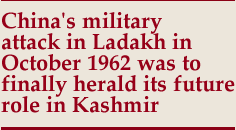 The implications of Bhutto's statement became far more serious following Premier Zhou's statement in Rawalpindi in February 1964: "The continuous development of friendly co-operation between our countries is not only in the interest of Pakistan and China, but also in the defence of peace in Asia and the world."
The implications of Bhutto's statement became far more serious following Premier Zhou's statement in Rawalpindi in February 1964: "The continuous development of friendly co-operation between our countries is not only in the interest of Pakistan and China, but also in the defence of peace in Asia and the world."
This was followed by Beijing making a fundamental shift in its policy of silence and intransigence on Kashmir (where the most it had said so far was that India and Pakistan should have peaceful, bilateral negotiations on the subject) to more anti-India postures of supporting the Kashmiri people's struggle for freedom as also supporting Pakistan and denouncing India as the aggressor and asking for a plebiscite.
Similarly, other post-1962 pacifist gestures of the Nehru government were to prove counter-productive with both the Chinese and Pakistani leaderships. First, Sheikh Abdullah was released from detention in December 1963. But encouraged by this new indulgence of China, Sheikh Abdullah made his first trip to Pakistan to further inflame this self-determination thesis.
From there, he visited Algiers to meet Zhou Enlai, who invited Abdullah to Beijing and assured full support for his struggle in Kashmir. Meanwhile, Nehru had also agreed to hold a summit meeting with President Ayub, but Nehru's death in May 1964 did not allow them to meet.
Instead of responding to these pacific gestures, the death of Nehru was to further ignite speculation about post-1962 India being at its weakest point, thus pushing Pakistan to begin its second war on Kashmir in September 1965.
Here again, China played an active pro-Pakistan role that went to the extent of threatening India with opening a second front while allowing Pakistan its airspace and other moral and material backing. This tied down a large number of Indian forces to the northern borders and ensured that it fought Pakistan with one hand tied behind its back.
This was to only further sharpen India-Pakistan hostilities resulting in the 1971 war and the dismemberment of Pakistan. And there lay the origins of Islamabad's search for nuclear technologies and their linkage to Kashmir.
From the Indian side, it was again the Chinese nuclear detonation in 1964 that diverted India from its pure scientific search for autonomy in all fields, including nuclear sciences, towards a nuclear weapon thinking and policy that was to build its own spiral with successive Pakistani leaders and then get entangled in the Kashmir conflict.
India's diversion towards nuclear weapons also ensured China's nuclear supplies to Pakistan. And the Cold War politics of Pakistan playing the frontline of the US-China-Saudi Arabia axis supporting anti-Soviet forces in Afghanistan was to greatly facilitate this China-Pakistan nuclear co-operation throughout the 1980s, which led Pakistan to declare itself a nuclear weapons capable state towards the late 1980s.
The rest, of course, remains well-known recent history. The 1980s also witnessed India's engagement with China leading to many breakthroughs in mutual confidence building leading to Kashmir gradually disappearing from China's dealings with Pakistani leadership.
The first noticeable and oft-cited example of this return to silence by the Chinese was the 1982 joint communique between Zia-ul-Haq and Zhao Ziyang in Islamabad. Since then, China moved to its much-celebrated neutrality during the Kargil conflict of May-June 1999 and during the more recent India-Pakistan military standoff since January this year.
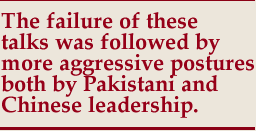 All this has been possible following some positive trends during the 1990s. Stable coalition governments becoming an accepted reality, economic growth rates staying much beyond the tradition Hindu rate of growth, the slow yet successful opening of the economy, followed by India's decision to exercise its nuclear option in 1998, all resulted in India being recognized as one of the emerging powers of the 21st century.
All this has been possible following some positive trends during the 1990s. Stable coalition governments becoming an accepted reality, economic growth rates staying much beyond the tradition Hindu rate of growth, the slow yet successful opening of the economy, followed by India's decision to exercise its nuclear option in 1998, all resulted in India being recognized as one of the emerging powers of the 21st century.
The Chinese have noted these changes over the years. And their own rise as a major power has put restraints on their behaviour, since being acceptable as a responsible power remains the biggest challenge for Beijing, which has powerful adversaries out to malign it.
It is in this context that the interactions between India and China have resulted in increasing mutual trust making India the largest trading partner of China from South Asia since 1993.
India today supplies half of the South Asian trade with China, which has created mutual awareness and goodwill on all issues, including Kashmir. Conversely, these years have seen Pakistan becoming isolated and a failing state with multiple challenges from political instability and economic adversity.
These are the ground realities that have gone in favour of the India-China friendship resulting in Beijing's policy on Kashmir coming full circle --- from silence and intransigence during the 1950s to a radical supporter of Pakistani claims on Kashmir as also of Kashmiris during the 1960s and 1970 to again becoming silent since the early 1980s and now keeping a pro-India neutrality since the mid-1990s. President Jiang advised the Pakistani senate in December 1996 to resolve all their disputes with India on a bilateral basis and Prime Minister Nawaz Sharief was rebuffed by the Chinese leadership when he visited Beijing in June 1999 to seek help on Kashmir.
Though one cannot hope that the return of China to its original 1950s policies will make it possible to postulate the same solutions to Kashmir that could have been possible during that time, this change in China's policy on Kashmir should ensure tranquillity on the India-Pakistan nuclear front and, in the long run, contribute to a final resolution of Kashmir.
(Dr Swaran Singh is associate professor at the School of International Studies, Jawaharlal Nehru University, New Delhi.)
